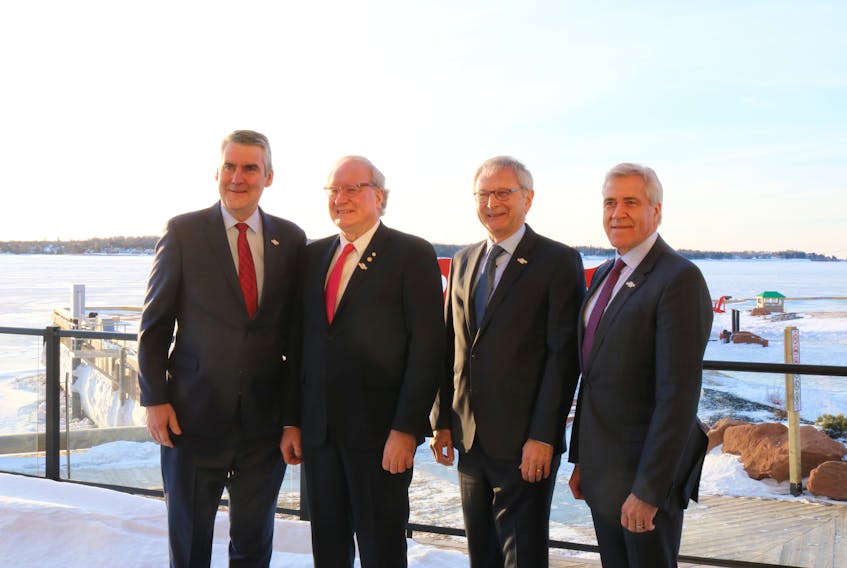CHARLOTTETOWN, P.E.I. - A regional electricity transmission system, linking hydro, nuclear, solar and wind power generated throughout the Atlantic region, was a main item on the agenda of the four Eastern premiers at a meeting held in Charlottetown on Wednesday.
Nova Scotia Premier Stephen McNeil, P.E.I. Premier Wade MacLauchlan, Newfoundland and Labrador Premier Dwight Ball and New Brunswick Premier Blaine Higgs discussed regional co-operation in health, trade and worker mobility.
The discussion around a regional energy corridor follows the 2017 completion of a subsea electricity cable connecting Newfoundland and Cape Breton, which will allow Nova Scotia access to hydroelectricity from the Muskrat Falls project. Wednesday’s discussion focused on a regional transmission system for the region as a whole.
"That will enable our citizens to benefit from the diversity of energy resources in our region," MacLauchlan said during a news conference Wednesday afternoon.
McNeil said a regional energy corridor would require addressing bottlenecks in the regional grid.
"What we're talking about in terms of an integrated energy system is basically building an energy highway," McNeil said.
"If you look at the border between New Brunswick and Nova Scotia, it's about a 300 MW line. It's too full, quite frankly. It's not allowing us to have access to energy on the New Brunswick side.”
McNeil said improving this infrastructure would allow other forms of energy, such as nuclear power from New Brunswick or wind power from P.E.I. to better feed into the regional grid.
Ball said the energy corridor could also mean lower electricity costs for consumers.
"We can actually bring benefits to ratepayers in all four provinces and do it in a reliable, sustainable fashion," Ball said.
The premiers will be seeking partnership from the federal government to improve the regional transmission system. They believe the system could also help reduce the region’s carbon footprint.
"I don't think there's any Canadians that can understand why there's so much restrictions around respecting the qualifications of our health care providers."
-Nova Scotia Premier Stephen McNeil
Streamlining certification
The premiers also discussed streamlining the certification for trades workers and health-care staff. Despite the region-wide demand for health-care workers, the process for certification for doctors, nurses and allied health professions is different in each province.
Despite national health-care standards in many professions, McNeil said the differing certification processes has made it harder to fill health-care staff vacancies.
"I don't think there's any Canadians that can understand why there's so much restrictions around respecting the qualifications of our health care providers," McNeil said.
Premier Higgs said integrating health certification will allow each province to better attract and retain health-care workers.
"It will require the co-operation of our colleges. These professions all have colleges or licences in their respective provinces,” Higgs said.
"We believe we can find common ground with the colleges to make that process more effective and more efficient."
The meeting was the first regional meeting for Higgs, the lone Progressive Conservative premier amongst a table full of Liberal leaders. Higgs admitted feeling “apprehension” prior to the meeting, but said the talks were largely positive and focused on issues of regional concern.
"We may not be politically related, but we're regionally related and that was the focus of this meeting," Higgs said.
'Put through scrutiny'
Premiers MacLauchlan and McNeil also discussed a proposed treated effluent pipe, running from the Northern Pulp mill in Pictou, N.S. into the Northumberland Strait. MacLauchlan has publicly stated that he favours a federal environmental impact assessment of the project, while McNeil said he will be requiring a provincial class 1 review of the project.
"I think the national government, to this point, has recognized it falls within our jurisdiction. We want to assure the people of Nova Scotia and Prince Edward Island that if we get an EA, it will be put through scrutiny," McNeil said.
Finally, Ball said the premiers have proposed a series of amendments to the federal Bill C-69, a controversial 2018 bill that amended the environmental impact assessment process for resource projects. Ball said the bill has slowed down pipeline projects.
"What we're looking for, and the amendments that we're proposing, would be around certainty, they would be around accountability," Ball said.
“Much of the industry has been talking about certainty, competitiveness and accountability to this process."
Ball said one proposed amendment would remove exploratory wells from the list of projects that would require an assessment.
RELATED









